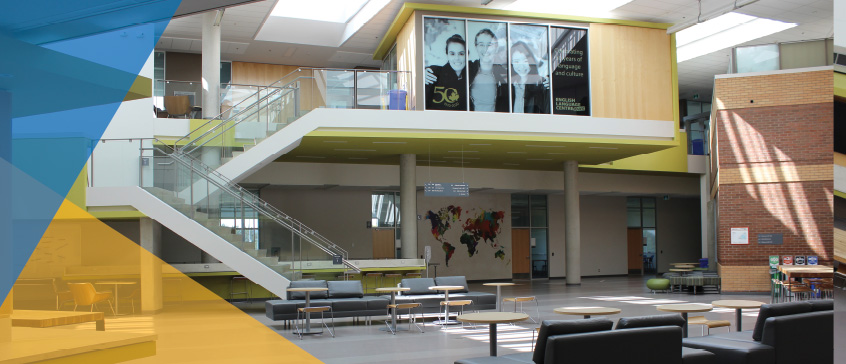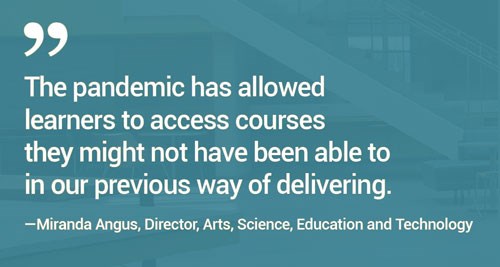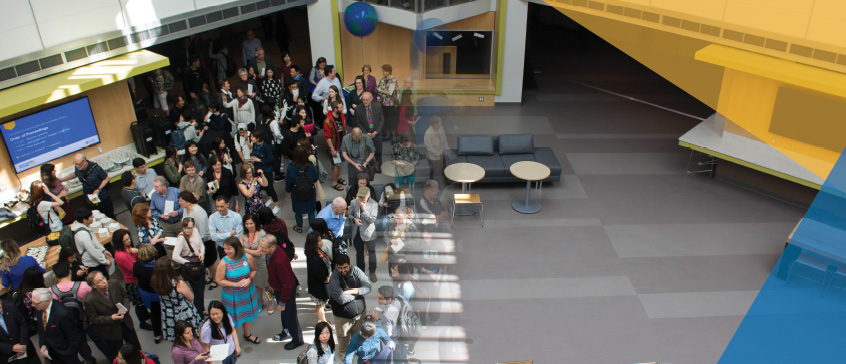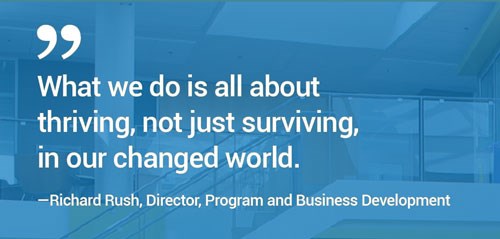Home / Continuing Studies News / Shifting perspectives during times of crisis
Shifting perspectives during times of crisis

By Don Mellings, Continuing Studies
We awoke to a new world in spring 2020. A new viral strain caused the World Health Organization to declare a pandemic. Suddenly aspects of our lives changed—our professional lives changed, our personal lives changed, and our educational lives changed. When Tania Muir, director of Cultural Management Programs, reflects on the attitude around the Division of Continuing Studies (DCS) at the time, she explains that the "immediate concern was for the health and wellbeing of the learners, instructors and staff in our unit who would be impacted."
As a division that encourages lifelong learning, the past few months have allowed instructors and staff to step up and continue their own lifelong learning journey—a journey that has seen them acquire new skills in telecommuting and learning the latest technologies. Tania maintains, "We have needed to find new ways of working, new ways of staying connected, and new ways of looking at education."
 Online learning is a new concept to many of the division's students and instructors; but fortunately, with over 40 years of experience, it is not a new concept for DCS. "For our unit, most of our programming is predominately online," says Laura Vizina, director of Health Sciences and Public Relations Programs. "My goal was to remain calm and ensure our online programming would continue without a disruption." Continued online courses have provided a sense of stability to students and staff during this unprecedented time.
Online learning is a new concept to many of the division's students and instructors; but fortunately, with over 40 years of experience, it is not a new concept for DCS. "For our unit, most of our programming is predominately online," says Laura Vizina, director of Health Sciences and Public Relations Programs. "My goal was to remain calm and ensure our online programming would continue without a disruption." Continued online courses have provided a sense of stability to students and staff during this unprecedented time.
"We had to very quickly establish how to transition traditionally in-person courses online," notes Miranda Angus, director of Arts, Science, Education and Technology. Instructors needed training "to not only use the technology to support teaching online, but [in] how to deliver the material they had originally prepared for a faceto- face environment"—a transition which was accomplished through the resilience of all parties involved.
At the division, the staff's job is to plan, says Miranda. "The biggest challenge in the earliest days was just not knowing with certainty what was going to happen next. This is the first time we've been in this situation, so we've had nothing to base immediate plans on, which was incredibly stressful." The immediate response was crisis management. Students needed to be well supported during this transition into the new normal; while at the same time, division planning was taking place for the future of its sustainable programming. "What we do is all about thriving, not just surviving, in our changed world," shares Richard Rush, director of Program and Business Development. "It's not just about doing what we did before, now remotely, but [it's about] actually embracing new opportunities using new technologies." The silver lining is that this world situation we are in has provided an opportunity for DCS to connect with more students in different ways.
 Photo: Remembering the events that once filled the building.
Photo: Remembering the events that once filled the building.
Enhancing the student experience is a strategic priority of DCS. Moving to an online platform while providing seamless, accessible and positive learning for students is a crucial part of the educational experience. Miranda believes that it is essential that students and partners are provided with exceptional service at the division. This difficult time has opened up future possibilities, she explains. "The pandemic has allowed learners to access courses they might not have been able to in our previous way of delivering— as an example, we've had great feedback from community members who are so happy to see our World Language courses of Spanish, Italian and Dutch transition online. We've already received requests that when we are able to offer more face-to-face programming, [that] we continue to run these courses online."
The division is very proud of its indirect connection to Provincial Health Officer Dr. Bonnie Henry. Accompanying Dr. Henry in the majority of her public announcements, we have seen DCS instructor Nigel Howard providing interpretation in American Sign Language. Nigel's expressive communication is so impactful as he communicates not only the message, but also the emotion and nuances behind the message through sign language.
For Tania, "Nigel's ongoing presence has been a reminder of the importance of communication during these challenging times, and the need to not only provide information to our learners, but to also express the emotion that accompanies it."
 Until you try online learning, you may not be able to imagine what to expect. DCS students who participated in online courses this past spring have been adaptable and receptive to the experience. Despite initial concerns about missed opportunities for personal interactions, networking and strong connections with their instructors, students have quickly adapted to the online learning environment. One student having said, "it was nice to be able to get together and meet everyone. It also made me think outside the box about how I could present to clients when we can't meet face to face." Students have commented on being pleasantly surprised by their experiences, including how dynamic the DCS course site was, the quality of interaction they experienced in the online environment, and the convenience and accessibility of learning in this new way.
Until you try online learning, you may not be able to imagine what to expect. DCS students who participated in online courses this past spring have been adaptable and receptive to the experience. Despite initial concerns about missed opportunities for personal interactions, networking and strong connections with their instructors, students have quickly adapted to the online learning environment. One student having said, "it was nice to be able to get together and meet everyone. It also made me think outside the box about how I could present to clients when we can't meet face to face." Students have commented on being pleasantly surprised by their experiences, including how dynamic the DCS course site was, the quality of interaction they experienced in the online environment, and the convenience and accessibility of learning in this new way.
Like a true continuing educator, Laura reminds us that there are many lessons to be learned throughout 2020. "I am optimistic that we will take the time to learn from these times, grow as a learning institute, and be able to continue to innovate to support a diverse learning population."
- Posted July 28, 2020
Latest News
- Operations management: where strategy becomes action
- Preserving our collective heritage: an interview with instructor Mary Kay Cunningham
- CRMP Newsletter - July 2024
- National Indigenous History Month and Indigenous Peoples Day
- Bridging degrees and dreams through UVic’s Pathway program
Visit Registration
2nd Floor | Continuing Studies Building University of Victoria Campus 3800 Finnerty Road | Victoria BC | CanadaTel 250-472-4747 | Email uvcsreg@uvic.ca
2024 © Continuing Studies at UVic
Legal Notices |
Sitemap

